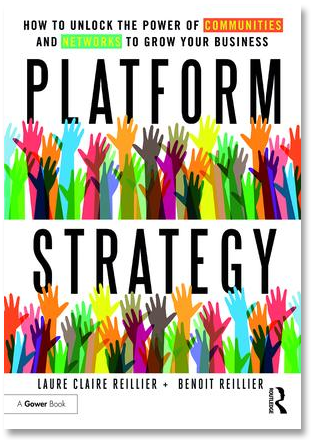Platform Strategy, book review: Business models for connected markets


Platform Strategy: How to Unlock the Power of Communities and Networks to Grow Your Business • By Laure Claire Reillier, Benoit Reillier • Routledge • 222 pages • ISBN: 9781472480248 • £28.50
Windows is a platform that software developers build on, as are Azure and Amazon Web Services (AWS). But Salesforce, eBay, and Etsy are also platforms, while Uber and Airbnb want to be platforms rather than taxi and hotel companies with a few technological bells and whistles. Unusually, Amazon is part traditional online retailer selling its own stock and part platform, with third-party merchants selling through Amazon and competing with it.
But what's so different about platforms that makes them a powerful business model, and how do they work in today's connected world of communities and networks? That's the subject of Platform Strategy by Laure Claire Reillier and Benoit Reillier, co-founders of Launchworks, which advises companies on new business models.
Markets used to be physical and local. Multinationals and credit card companies changed that, but not nearly as much as technology. The web didn't just get companies connected more directly to customers; it also enabled new business models that relied on those connected customers and suppliers communicating and networking, adding value -- or even becoming the business, in the case of eBay.
A platform doesn't produce anything, the authors explain, and might or might not distribute goods and services itself. What a platform does is directly connect different customer groups to enable transactions. This means it can scale more than a business that has to do everything itself, and can create value by doing that.
That's a very wide definition, but it lets the book cover a wide range of businesses, from Amex to TaskRabbit, and a range of business models -- like marketplaces, social and content networks, payment platforms, and operating systems, which can all act as open networks rather than traditional, linear value chains going from raw materials to finished products.
Authoritative and detailed
Platform Strategy tries to decode the economics of platforms. Some of that is looking at multi-sided markets, like credit cards where charges to merchants enable subsidies and free cards for buyers. But for platforms like eBay it can be about putting a price on things you might not think of in that way: the annoyance factor of something you no longer want or need that's taking up space; the amount over the winning bid that a buyer would have paid. Whether or not that feels realistic depends on your approach to economics, but it does help to explain why investors are so interested in platforms.
Download now: Essential travel tips for business pros (free ebook)
Some of this gets a little academic (all the chapters have dense sections of footnotes), but if you really want to understand platforms and build a successful business on them, this is an authoritative and detailed guide.
The authors don't assume that readers are already familiar with externalities, economies of scale, network effects, critical mass, price elasticity and whether products complement or substitute for each other, or even what the key components of business models and ecosystems are. Clear explanations put all these concepts in context, with potted histories of Amazon, Apple, and Google walking readers through business models in action.
You don't have to buy in to the authors' 'rocket' model -- where it takes a lot of effort to build and launch a rocket, but once it reaches escape velocity it takes less energy to keep going -- to find the discussion of the different stages of first building then scaling and maturing a platform strategy useful and interesting, whether you're a startup or an existing organisation.
Although written before much of the backlash against Uber, the chapter on the importance of trust to a platform is a good examination of the issues needed to reach and keep users. The section on regulation favours Uber and Airbnb over laws about passenger safety or the impact of short-term rentals on available housing, while suggestions about competing with platform companies boil down to 'don't spread FUD, try to become a platform yourself'.
Similarly, there's a lot more emphasis on understanding pricing than keeping customer satisfaction high. Many of the companies covered are technology companies in the sense that technology usage is fundamental to their business (Uber, Airbnb and eBay for example), and the book is much stronger on the details of business than technology.
If there's a downside to Platform Strategy, it's how much the authors believe that platforms are taking over the world. They have plenty of industry experience, which shows in the detailed and accurate advice on how to build and run a platform, but you'll be left with the impression that there are no alternatives. As a result, this a useful guide to understanding and creating platforms, but hardly a rounded view of all possible business models.
PREVIOUS AND RELATED CONTENT
Rootstock acquires Kenandy as ERP on Salesforce platform consolidates
Rootstock's purchase of Kenandy will enable the company to expand into more areas for enterprises looking to launch cloud ERP built on Salesforce's technology.
Freelancer launches global Enterprise platform
The ASX-listed freelancing marketplace says its vendor management system enables organisations to oversee their workforce in real-time.
No more Uber, Hertz, or even car owners: How Amazon and Apple will take us all for a ride
As driverless technologies improve, cars will likely become more of a membership perk than objects of ownership.
Shopify adds eBay as its latest merchant sales channel
The integration will allow users of Shopify's e-commerce platform to sync their inventory and sell their products on eBay directly from their Shopify accounts.